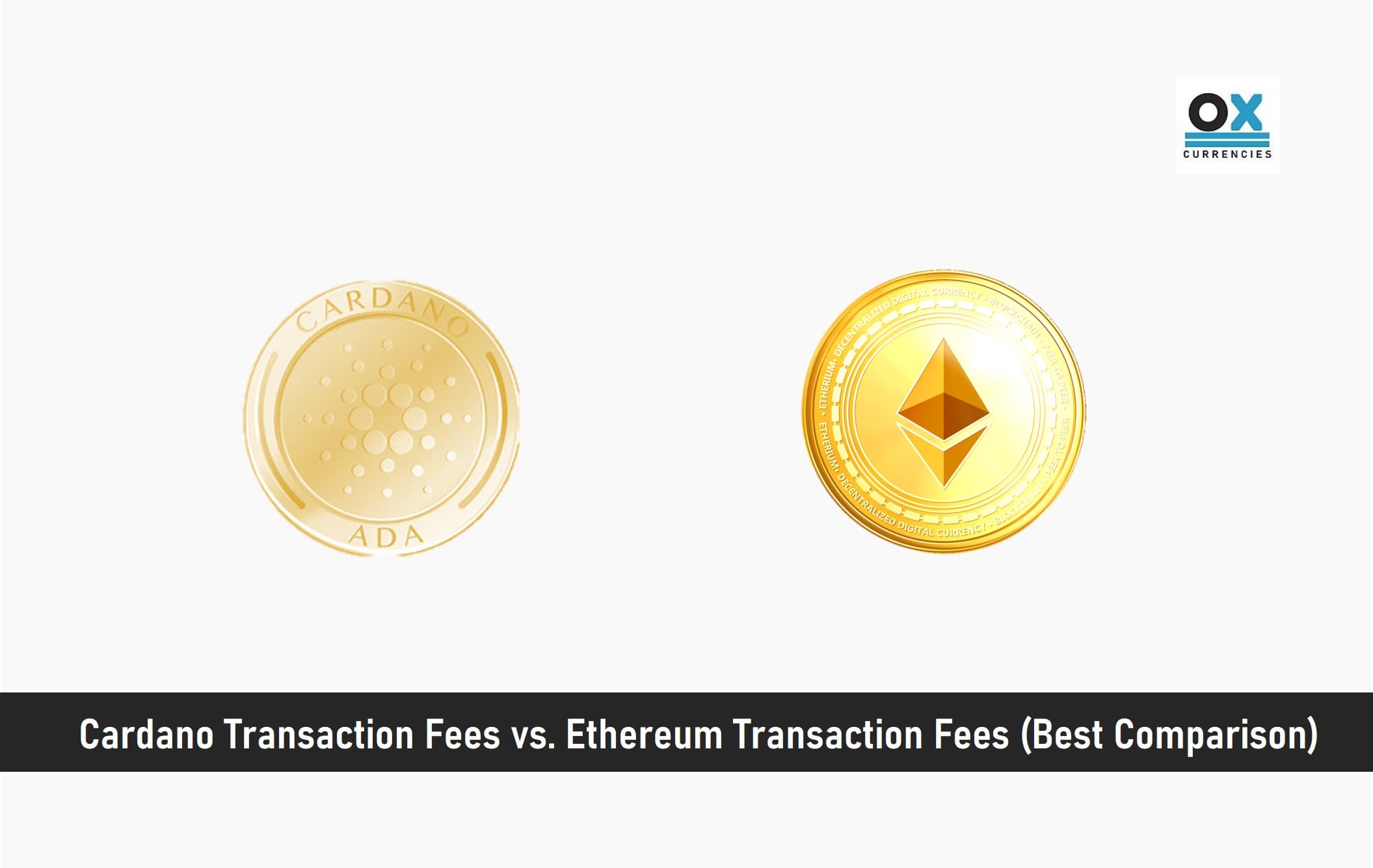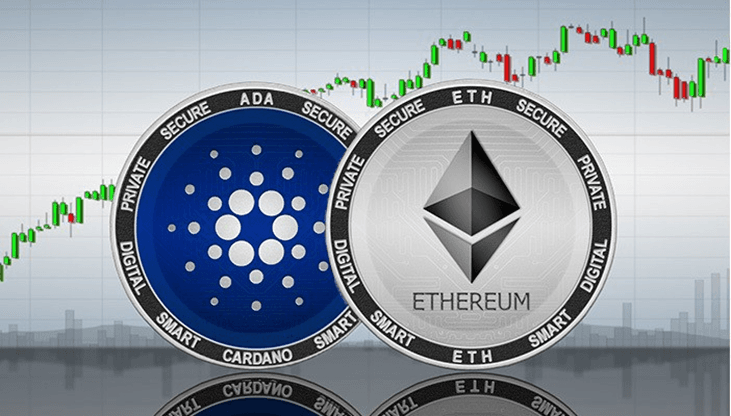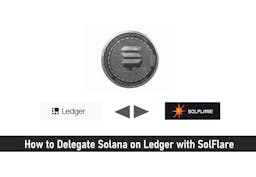
Cardano’s emergence has prompted a comparison to Ethereum simply because they have similar capabilities, having been created by the same developers.
However, despite their similar offerings, there are still certain aspects of these cryptocurrencies that are quite different, one of which is transaction fees.
The transaction fees are payments made by investors for carrying out certain transactions on the blockchain platforms of these cryptocurrencies.

Key Takeaways
• Cardano has cheaper transaction fees than Ethereum, with an even faster transaction speed.
• Ethereum is still widely popular and is used for transactions by many investors despite the existence of Cardano.
• It may take some time before we witness Cardano surpass Ethereum in terms of its market position, although its better functionality is a good start.
• The Ethereum blockchain is the major blockchain for NFTs, with over 80,300 NFT collections on it.
That said, we should make a comparison of the transaction fees of both cryptocurrencies to decide which is best to use for processing transactions.
SEE ALSO: How Much Faster is Cardano than Ethereum?
SEE ALSO: Top 10 Cryptocurrencies Cardano Whales are Buying right now
SEE ALSO: Is Polkadot Better Than Cardano?
Cardano: An Introduction
Cardano was introduced officially into the crypto market in 2017 by Charles Hoskinson and had similar developers to Ethereum responsible for its emergence.
It was created with environmental sustainability in mind using pioneering technologies, as evidenced by the proof-of-stake and Ouroboros protocol.
Tagged “the Ethereum killer,” Cardano comes with features that are highly efficient in all ramifications, with the capacity to handle up to 250 transactions per second.
Today, it is one of the biggest and best-performing blockchain platforms in the crypto market.
Ethereum: An Introduction
Ethereum was officially launched in 2015 and has today become the second-largest cryptocurrency in the crypto market by market value.
The Ethereum blockchain responsible for the ETH cryptocurrency is also highly decentralized and has been the basis for the creation of other tokens known as NFTs.
Today, over 80,300 NFT collections are on the Ethereum blockchain, which is no small feat.
Previously, Ethereum utilized the proof-of-work protocol, which caused it to use excess energy that was environmentally unfriendly.
Today, it has upgraded to Ethereum 2.0, which uses the proof-of-stake protocol and offers more benefits, making Ethereum an even more attractive choice for investors.
Cardano and Ethereum: A comparison of their transaction fees
Cardano is known to be highly decentralized, making major improvements where Ethereum otherwise failed.
Cardano uses a transaction fee system that covers the processing and long-term storage costs of transactions.
The Cardano environment is unique in the way it handles fees, as fees do not go directly to the block producer. Instead, they are pooled and then distributed to all pools that created blocks during an epoch.
There currently are no fees for the memory cost of tracking the accumulated chain state, in particular UTXO.
However, Cardano does have gas fees for transactions. On average, a Cardano transaction fee is somewhere between 0.16 and 0.17 ADA.
This fee is considered one of the least expensive transaction fees in the crypto market, making the Cardano blockchain very affordable.
On the other hand, Ethereum’s average transaction fee is 0.6278 ETH, although the Ethereum transaction fee varies and there is a minimum and maximum limit for transaction fees you can pay.
With a look at the transaction fees of both cryptocurrencies, one would realize that Cardano offers more affordable transaction fees than Ethereum.
This transaction fee in particular has been one of the reasons why investors have moved from Ethereum to Cardano, with them complaining about how expensive Ethereum’s transaction fees are.
Why Transaction Fees are Important
Transaction fees are important simply because they help secure and give credibility to the blockchains of both Ethereum and Solana.
Transaction fees are also used to prevent unnecessary spamming by bad actors, as well as hostile infinity loops and other computational waste in code.
Despite its high fees, Ethereum has stated that the reason for its high fees is due to its popularity.
Also, another thing to look at is the number of blocks, since these blocks limit gap spaces.
Finally, one point to note when conducting transaction fees on Ethereum is that the base gas fee is put into consideration, along with the gas price, to arrive at an acceptable transaction fee.
Nonetheless, if transaction fees aren’t your problem, you can always go for Ethereum to help you process transactions, while Cardano is readily available should you find Ethereum’s fees too expensive.
Features of Cardano and Ethereum
The following are the features of Cardano and Ethereum respectively:
| Features | Cardano | Ethereum |
| Launch | 2017 | 2015 |
| Main use | Monetary transactions and support for smart contracts | Smart contract support |
| Transaction function | Smart contract operations | Smart contract operations |
| Factor behind forks | Academic reviews and peer-reviewed research | General voting on what to do with the current blockchain |
| Maximum available supply | 45 billion | None, but the total supply cannot grow by over 4.5 percent in one year |
| Type of protocol used | Proof of stake protocol | Proof of stake protocol |
From the looks of the features present in the table above, it is obvious that Cardano and Ethereum both have excellent features that investors will find particularly interesting, irrespective of the transaction fee differences between them.
Frequently Asked Questions (FAQs)
Is the Ethereum blockchain worth transacting on despite the high fees?
Ethereum is still worth transacting on as it depends on where the user’s preference lies. Today, there are still numerous investors who still carry out transactions on the blockchain platform despite its high transaction fees.
Which blockchain has a faster transaction speed between Ethereum and Cardano?
Cardano has a faster transaction speed than Ethereum clocking at 250 transactions per second compared to Ethereum’s 25 transactions per second.
Final Thoughts
Cardano and Ethereum are blockchain platforms that are highly efficient in their own right, although Cardano may have the edge in both transaction speed and transaction fees.
However, Ethereum’s blockchain is still more popular and you can set the limit of the transaction fees you are willing to pay. For this reason, it may take some time before Cardano dethrones Ethereum.
Read More




